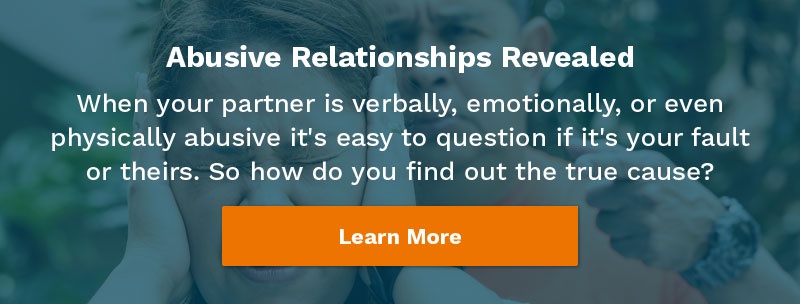
6 Min Read
Contents
- Understanding Defensiveness In Your Relationship
- What Defensiveness In Relationships Can Look Like
- Why Some Partners Are More Defensive Than Others
- How Defensiveness Is Hurting Your Relationship
- Can You Change Defensive Behavior In Your Relationship?
- What To Take Away
See if you recognize any of the following statements:
- “If you were more helpful, I wouldn’t always be so cranky."
- “I only say those things because you frustrate me.”
- “Yeah, well, you’re no better!”
Ringing a bell?
If these or similar statements are familiar, you’re dealing with defensiveness in your relationship.
Defensiveness in relationships isn’t uncommon. It’s a reactive behavior generally occurring during an argument or when one partner feels criticized. It’s also a symptom of poor communication.
On its own defensive behavior will cause problems for the person displaying it, but when defensiveness becomes commonplace in a relationship, it can create more significant issues or exacerbate current ones.
Understanding Defensiveness In Your Relationship
Effective communication plays a crucial role in fostering a healthy connection in every relationship, be it romantic, familial, or professional. Defensiveness in relationships is a barrier to open and honest communication and can quickly degrade any connection.
So, why does it happen?
Defensive behavior is a self-protective response triggered by fear of vulnerability or inadequacy. When individuals perceive negative feedback, criticism, or an attack, they instinctively shield themselves emotionally. This can manifest as:
- Becoming argumentative
- Denying responsibility
- Shifting blame
- Verbally attacking the other person
In a relationship, a partner may become defensive because they're afraid of being misunderstood, judged, or invalidated. Recognizing and addressing defensiveness is essential for building stronger and more fulfilling relationships.
What Defensiveness In Relationships Can Look Like
Would you automatically recognize defensive actions in your relationship?
They’re not always as straightforward as you might think. Defensive behavior actually comes in several forms.
It’s not always as clear as, “No, I didn’t.”
The following are all examples of defensive behavior in a relationship:
- Denial. Refusing to acknowledge or accept responsibility for their actions or the impact they have on the relationship is a defensive behavior.
- Blaming. Instead of taking accountability, a person may blame their partner or others. They might also point out their partner’s flaws or mistakes to divert attention from their behavior.
- Justification. Trying to rationalize their actions or decisions to make them seem reasonable or justified is defensive behavior.
- Avoidance. A defensive partner may avoid the discussion when faced with uncomfortable or difficult conversations.
- Counterattacks. Rather than addressing the concerns raised by their partner, a defensive person may launch counterattacks, bringing up unrelated issues or past events to deflect attention and regain a sense of control.
- Minimization. Someone exhibiting defensive behavior may downplay the significance of their partner’s feelings or concerns. They might belittle or trivialize their partner’s emotions, causing them to feel invalidated or unheard.
- Stonewalling. This involves withdrawing from the interaction entirely and refusing to engage or respond. They may shut down emotionally, becoming unresponsive or using the silent treatment instead of communicating.
- Manipulation. Tactics like using guilt, emotional blackmail, or gaslighting are defensive behaviors in a relationship and undermine their partner’s perceptions or feelings.
Why Some Partners Are More Defensive Than Others
There can be several reasons why a partner may become overly defensive.
Among the most common reasons for defensiveness in relationships are:
- Insecurity.Feelings of insecurity or low self-esteem can lead to perpetual defensiveness in all areas of life, including relationships. If a person feels inadequate or fears criticism, they may become defensive as a means of protecting themselves and their self-image. They may perceive even minor comments or suggestions as personal attacks, triggering a defensive response.
- Fear of conflict. Some individuals have a strong aversion to conflict and may become defensive to avoid it. They may worry that engaging in open discussions or acknowledging their mistakes could lead to confrontations or upsetting outcomes. Defensiveness becomes a coping mechanism to maintain control and protect themselves from potential conflict.
- Past experiences. Negative experiences, such as abusive past relationships, can contribute to a person’s defensive behavior. If someone has been hurt or betrayed, they might develop a heightened sensitivity to criticism or perceived threats. This can lead to becoming defensive in current relationships as a protective mechanism.
- Communication issues. Ineffective communication patterns within a relationship can contribute to defensiveness. If a couple struggles to express their thoughts, feelings, and needs openly and honestly with each other, it can create an environment where defensiveness becomes a default response.
- Guilt. In some cases, defensiveness in a relationship occurs as a response to feelings of guilt or when someone is hiding something. If a partner engages in behavior they know to be wrong or harmful, they may become defensive when their actions are questioned or confronted.
It’s important to remember that individual circumstances can vary, and people’s behaviors are influenced by a combination of factors.
How Defensiveness Is Hurting Your Relationship
Defensiveness can erode trust and intimacy in relationships. It creates a cycle of miscommunication, as one person’s defensiveness can trigger the other person’s defensiveness in return.
Dr. Kurt has seen firsthand the destruction caused by defensiveness in a relationship. According to him,
I can tell you from years of direct experience working with couples that defensiveness in relationships is a communication and intimacy killer. It's like a cancer that slowly destroys the love and connection. Unfortunately, for many of us it's such an automatic response that we don't even realize we're doing it. Just think about how long it's existed for all of us. As a kid, when our mom asked us if we did something wrong our first response was some version of, 'No, Sara did it.' Fortunately, despite decades of reinforcement, these defensive responses can be changed."
In addition, defensiveness in relationships can cause,
- Breakdown of communication. When one or both partners become defensive, it becomes difficult to effectively communicate. Defensiveness can lead to deflection, denial, or avoidance of responsibility, preventing effective problem-solving and understanding.
- Escalation of conflicts. Defensiveness often triggers a cycle of escalating conflicts. When one partner becomes defensive, it can cause the other partner to become aggressive or defensive themselves.
- Lack of emotional safety. Defensive behavior creates an atmosphere of emotional insecurity within the relationship. When one partner feels constantly attacked or criticized, they may withdraw emotionally or become guarded.
- Invalidation of feelings. When a defensive partner dismisses or invalidates their spouse’s feelings or concerns, it can lead to feelings of neglect or being unheard.
- Lack of growth. Defensiveness can stunt personal and relational growth. When partners are defensive, they’re less willing to acknowledge their faults, take responsibility for their actions, or learn from their mistakes. This can impede personal development and prevent the couple from working together to grow their relationship.
Defensiveness can cause both partners to listen less attentively, be unable to empathize with their partner’s perspective, or find common ground. Over time, this can lead to resentment, emotional distance, affairs, and even divorce.
Can You Change Defensive Behavior In Your Relationship?
Yes.
Whether it’s your partner or yourself, stopping defensive reactions in your relationship is possible.
Although it can take time, the strategies below can be valuable in overcoming defensiveness in your relationship.
- Reflect on your own behavior. Before addressing the issue with your partner, take a moment to evaluate your own actions and communication style. How well do you express yourself clearly and calmly without resorting to aggression or blame?
- Self-awareness. Become aware of what triggers a defensive reaction. Reflecting on how certain comments or situations lead to defensive behavior can help you troubleshoot and change the pattern.
- Timing! Timing is crucial when discussing sensitive topics. Find the time and setting to have an open and uninterrupted conversation.
- Choose your words wisely. “I” statements can be more effective than accusatory language. Focus on expressing your own feelings. For example, say, “I feel unheard when I try to express my thoughts,” instead of, “You never listen to me!”
- Validate. Showing empathy and acknowledging feelings through statements like, “I understand that this topic might be difficult for you to discuss, but we need to address it together.”
- Practice patience. Changing defensive behaviors takes time, so be patient with your partner.
If the defensiveness persists and affects your relationship significantly, couples counseling may be needed. A trained professional can help facilitate healthier communication patterns and address underlying issues contributing to defensiveness.
What To Take Away
Defensiveness in a relationship can derail communication and cause significant damage if left unchecked. If you’re dealing with defensiveness in your relationship keep the following in mind:
- Defensiveness in relationships can take several forms.
- There are a number of causes for defensive behavior.
- By understanding the cause of defensiveness, you can more effectively implement strategies to address it.
- Active listening, empathy, and a willingness to understand and validate each other's perspectives are important parts of dispelling defensive behavior in your relationship.
- Seeking the assistance of a professional counselor can also be beneficial in overcoming defensive behavior in your relationship.
- Overcoming defensiveness is crucial for cultivating understanding, trust, and growth in any relationship.
Just because defensiveness in relationships is common doesn’t mean it’s healthy or should be accepted. Remember, building strong communication is a joint effort, and it’s essential for both partners to be willing to address and improve their behavior.
Looking for More? Check Out These Articles
- Are You PISD? Why You Might Have Post Infidelity Stress Disorder
- I Can't Think Straight! Is This A Midlife Crisis?
- I'm Trying To Quit Porn, But I Just Can't
- Get More Relationship Advice





































Comments
Currently, there are no comments. Be the first to post one!